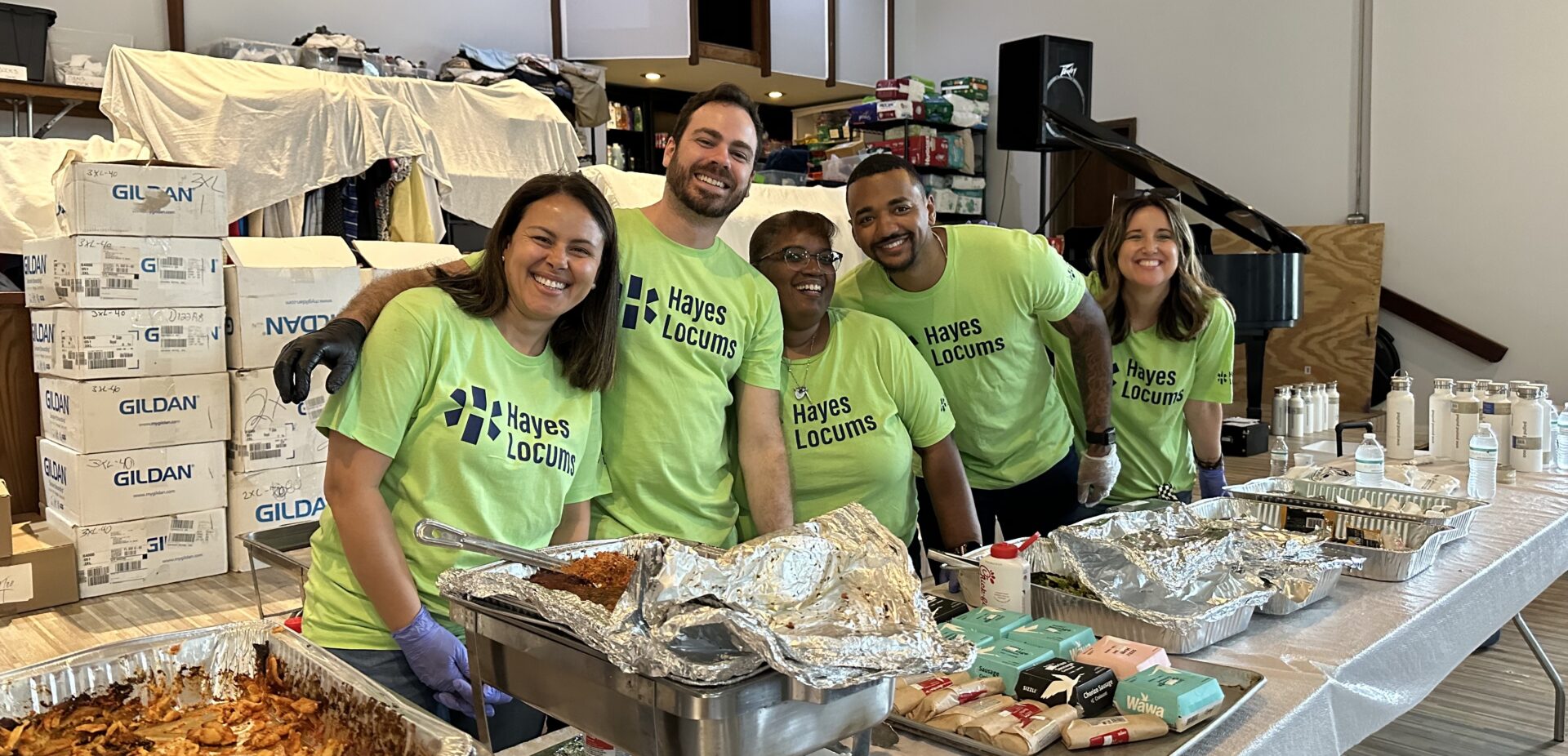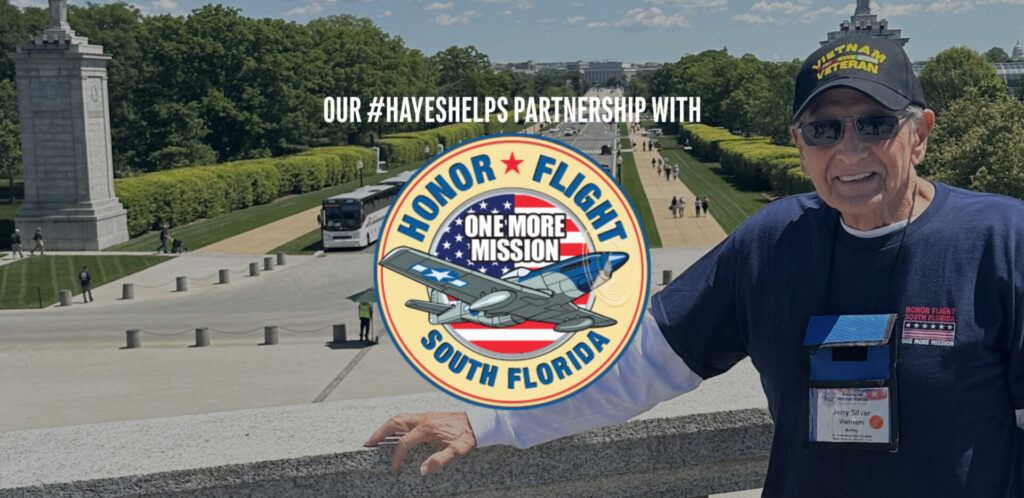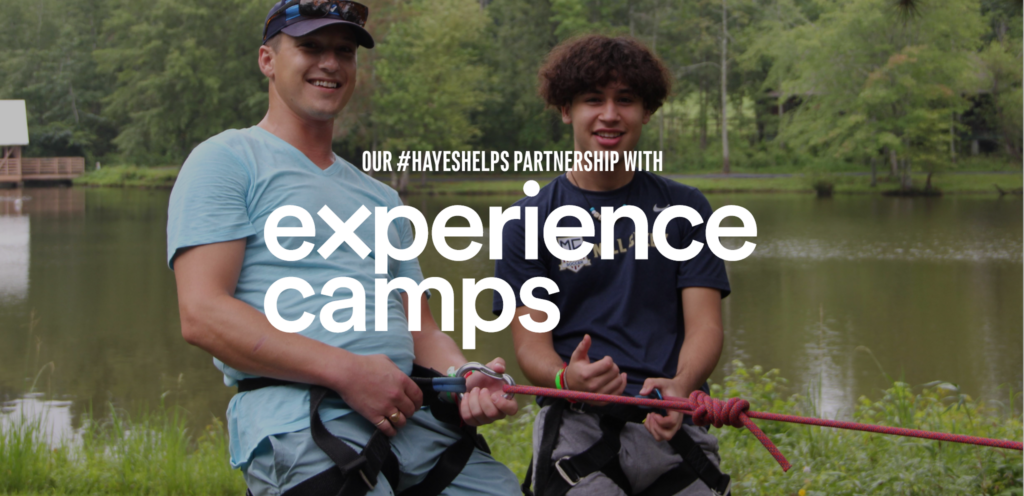Happy National Volunteer Week! Established in 1974, this week is a time to recognize the work of dedicated volunteers who show up every day to make their community––and the world––a better place. This week, we’re highlighting one of our Hayes Helps partners, Hope South Florida.
Hope South Florida offers a holistic response to homelessness through a continuum of care that includes rapid re-housing, emergency shelter, daycare referral, free meals, employment assistance, and other services designed to lead individuals and families struggling with homelessness from crisis to recovery. They serve around 250 families with housing, and provide close to 90,000 meals per year.
Their invaluable work is also dependent on volunteers: over 100 volunteers show up every week to serve and support the homeless people of Broward County.
We spoke with Pery Canan, a member of the leadership team, to talk about Hope South Florida’s work, and how they couldn’t do it without their volunteers. Here’s what he had to say:
Tell us a little bit about Hope South Florida and how it began.
It’s a great story. In 1995, a local veterinarian named Fred Scarborough was going to his church on Thanksgiving––his two children had volunteered to provide a meal for the homeless, and he somewhat agreed to take them.
They bussed the homeless in that day from what was called Tent City, down in downtown Fort Lauderdale, and brought them to Christ Church in Fort Lauderdale. And as Fred stood there watching men and women lug their suitcases and backpacks, he saw a family get off the bus. And he was really moved by that. He didn’t expect to see families there.
Later, during the banquet, he felt a tug on his heart and sat down with the family, and asked to hear their story. They told him about this series of unfortunate things that had happened and how they found themselves homeless. So he gave them his business card, and asked them to give him a call on Monday. When he got to his office on Monday, he had several voice messages from this family, asking him for help. So he called them back and said, I don’t know what I can do, but how about I start by putting you up in a hotel for a week or two?
So he paid for a hotel. And then after a few days, he got another call from another family who had heard he had put some people they knew up in a hotel and asked if he would help them out. And sure enough, he put another family in the hotel.
Before long, the word got back to the senior pastor at Christ Church, and he called Fred and said, what the heck are you doing? You’re spending all your personal money, putting families into hotels. And Fred said, well, you preach from the pulpit that we’re supposed to help the poor!
Long story short, the senior pastor put them in touch with a local foundation, who agreed to give a $250,000 gift to purchase a motel in Fort Lauderdale, if he formed a 501(c)(3). On Dixie Highway, there was a former hotel that was being used at the time as a crack house, and they contacted a realtor and bought it. Probably within six months or so, through the efforts of a lot of good people, they cleaned up the property, and started putting homeless families into that place.
That’s how the ministry started. They didn’t have a real plan. But the next thing you know, we were starting to put families into the motel and the ministry grew from there.
Do you have any favorite stories from those early days?
There are so many great stories. I had one young lady very early on, who I remember so well.
Her family arrived in a beat up old Volkswagen station wagon with two young boys and this little girl who was about two-and-a-half years old and looked just like Shirley Temple. Everybody just loved this little girl, and so they would hold her and spend time with her. And she never spoke a word. At two and a half years old, you’d think by that time they’d be yelling and screaming and hooting and hollering, but she never said a word to any of us.
About five years later, we ran into them, and their father came over and hugged me, and told me they were back on their feet and happy. And then that little girl––well, she wasn’t little then–– came running over and jumped up in my arms and gave me a big hug, and said thank you. Those were the first words I ever heard that little girl say.
I knew right then that we were doing what we’re supposed to be doing. It was an example of what can happen when you help these families to help themselves, how they can eventually become independent again. It’s nice to be able to look back on that time, and see that they’ve broken the cycle of homelessness. That’s the key, because homelessness can sometimes breed homelessness. And our goal is to break that cycle.
How has the work of Hope South Florida expanded since it began?
When we started out, the heart of our ministry was to support single moms and families. When the other churches got involved, and we became Hope South Florida, we started thinking about how we could help individuals. That’s when services expanded from housing and life skills to meals and mobile showers.
The mobile showers came out of a prayer request. People were saying that they couldn’t find places to take showers––they weren’t allowed to go down to the beach, the city didn’t like them showering there. So we introduced the mobile showers, which had a lot of impact on their dignity and self-respect.
From there, one thing just led to another. We started collecting mail for the homeless––we collect almost 600 different individuals’ mail here at Hope South Florida––and then during COVID, we helped people get their stimulus checks. I think we got almost a million and a half dollars of stimulus checks for the homeless in our community. We also do eyeglass exams now once a month, we do haircuts. We have a clothing ministry. We have a guy helping with food stamps on Wednesdays. We’ve had days where they have their feet examined, and we wash their feet and bring them new shoes and socks. We do a number of different things, but it’s all based on need.
30 years ago we were sitting in a boardroom saying we need more partners, and now here we are, with 60 churches that are now partners with Hope South Florida. We’ve come such a long way, but we still have work to do. Homelessness is still very much a part of our community. So we just need to continue to do the best we can. And we can’t do that alone.
It’s Volunteer Appreciation Week––can you talk about how volunteers play a role in Hope South Florida’s work?
One of our largest services is our shared meals. It started with one meal every week on Thursdays, which we called Meatloaf. We started getting volunteers to come in and help out. And then we started to expand our meals.
Our goal was to eventually be able to provide meals seven days a week, but we couldn’t do it alone. We didn’t have enough staff. You need the volunteers, and you have to allow them to engage the ministry, to come out and cook or serve a meal, to create relationships with people.
That’s the role of the volunteer. We’re currently serving around 9,000 meals a month.
How many volunteers does it take to operate Hope South Florida?
We can get well over a couple 100 volunteers each week, who combined put in about 1000 hours of volunteer time a week.
There’s a lot of work that’s done behind the scenes. It’s not just the volunteers who come out and serve the meals. There are also volunteers behind the scenes that are preparing these meals, or doing clothing or toiletry drives.
It’s hard to put a handle on how many, but for any given meal––and we’re doing one every day of the week, sometimes twice a day––you’re probably looking at anywhere from 20 to 30 volunteers that touch that meal in some way, whether they’re preparing the food, shopping for it, or serving the meal. We couldn’t do without them. We just could not do it without them.
Do you tend to have a lot of repeat volunteers?
Very much so. Each night’s shared meal has their group of volunteers that are pretty consistent and come every week. So we have a series of core volunteers for each night, and then we mix that in with large groups that come in a couple times a year.
[Hayes Locums] volunteers are the best, because they come here with such a cheerful attitude. They’re very engaging. We had a group from Hayes Locums last week, and when we circled up before the meal, I asked them what the one question was that they should ask every homeless person they encountered. Nobody could answer the question. So I told them: Ask them their name, because nobody ever asks their name. These people want to be known or who they are, not somebody who is looked upon as an aggravation in the community. These are humble people, who have just run into some bad luck and need people to encourage them and to lift them up. And that’s what we do.
When you establish a relationship with a person and build on that relationship, and provide encouragement and love and motivation, they can change. They can make small steps. Maybe go out and find a job for a few days a week, or start having better self esteem and self dignity. And a lot of the time that’s based on relationships, just having somebody investing in their life.
Do you have any stories on how volunteers made a difference in someone’s life?
We had a gentleman who used to come on Thursday nights to the Meatloaf meal. He would wander in, often under the influence of something, and we would sit him down, provide him a meal, and our volunteers would circle around him, and then he would leave and we would lose sight of him until we saw him next Thursday.
One Thursday, he stopped showing up. That went on for about a month and we were really concerned. One of our volunteers was able to find out his real name, and that he had been arrested and was in jail. The only night we could visit him was on Thursday nights, which was the night of our meals. There were about six of us core volunteers, and we would rotate every Thursday night––somebody would go to jail, and we’d visit with him and encourage him to keep his hope up, until he got out of jail.
[After he got out, with the support of Hope South Florida], he turned his life around. He is now a father of a little boy. He’s happily married. His life is in order. That was a great story of the impact a core volunteer can have on the life of a person.
*This interview has been edited for clarity and length.
Want to get more involved in Hope South Florida? Sign up to be a volunteer. Or, if you’re not local to the area, you can support them with a donation: it costs only $3 to provide a meal for each individual, so even the smallest donation makes a difference.



